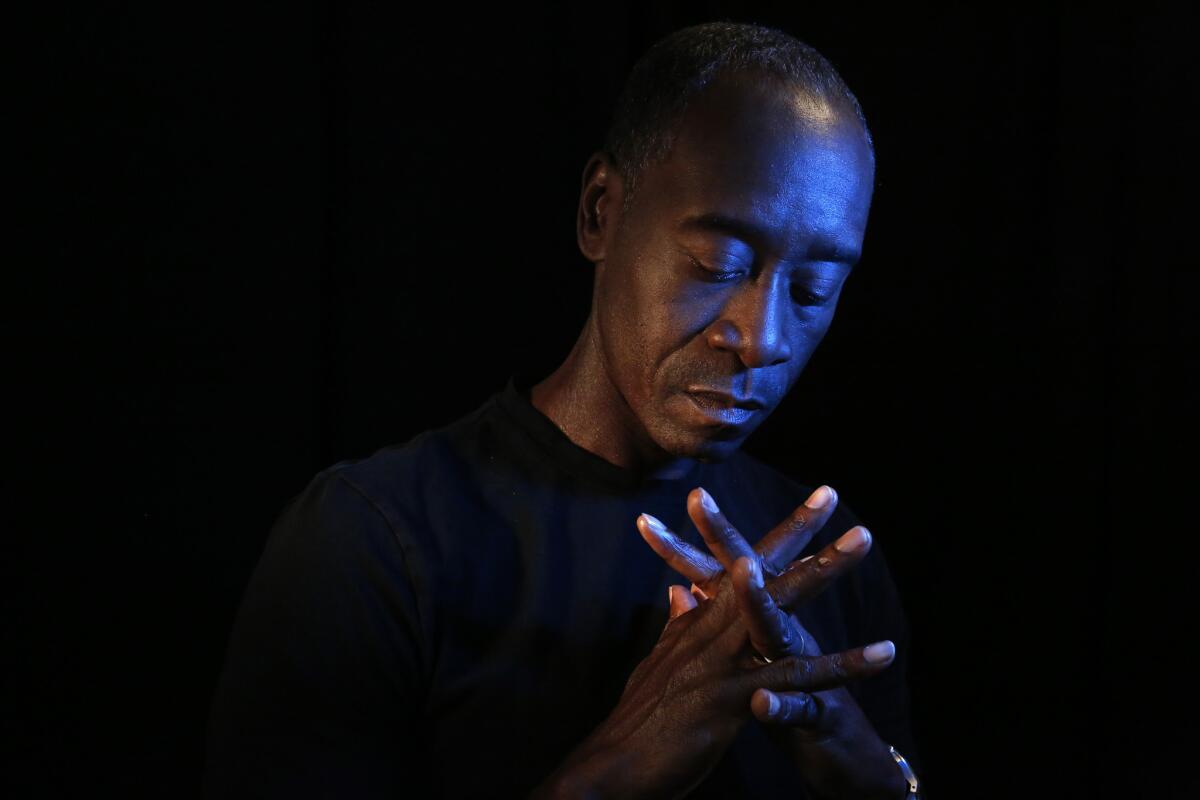Don Cheadle makes his Miles Davis film ‘feel like Miles and not just be about Miles’

- Share via
There was some symmetry at work in this year’s release schedule, which included two movies drawn from the storied history of jazz. One, “Miles Ahead,” centered on Miles Davis as a genius fallen into dark seclusion in the late ’70s and the other, “Born to Be Blue,” looked at fellow trumpeter Chet Baker and his battle with a heroin addiction. A bit unfairly for such a rare cinematic subject, both films were released only a week apart this spring.
Both offer snapshots in time for two revered musicians, and both toy with facts to upend biopic conventions, particularly “Miles Ahead,” which was written and directed by its star Don Cheadle and used the nature of Davis’ art as inspiration for a story that freely breaks from reality to resemble a heist movie.
Both films also hinge upon their central performances in Cheadle, who inhabits the gruff, laconic mystique of Davis, and Ethan Hawke, who imbues the trumpeter’s struggle to come back from his addiction with a delicate, desperate vulnerability. Here Cheadle discusses his work.
How did you settle on exploring his sort of ‘quiet period’ of the ’70s for this movie?
I had seen the exhibit that had been touring around the world, the Miles Davis exhibit in France. When you walk into that five year period – it’s a very hands-on [exhibit] – it’s velvet and stark and the roof is low, not a lot is in there. It’s just very intriguing the moment where this incredibly prolific artist shut it down, and why? What was happening? And how do you come out of that? Did he even know at the time if he was going to come out of it? Was he just over? So everything felt like it was kind of saying, “This is a period to talk about and this is a place when he’s trying to figure out what to say and how to come back.”
It seemed like even the term “biopic” was something you weren’t crazy about being attached to this movie.
From the very beginning I said this is not that, this isn’t going to be cradle-to-grave, this isn’t going to be a greatest hits. This is going to be – I want to approach this, through the medium that I’m using, in a way that I believe Miles approached his medium. I think the movie should feel like Miles and not just be about Miles.
And listening to the rules that Miles Davis laid down – don’t do it the same, fear no mistakes for there are none, don’t do the last thing, do the next thing. Don’t repeat yourself. That was all of his rules. If he heard you rehearsing something in the hotel room and you came downstairs and played your rehearsed solo onstage, you were fired on the spot. He paid people to practice in front of the audience, to dig and show you the warts.

The film’s heist conceit was kind of a line in the sand for a lot of people. What drew you to having that as part of the story?
I wanted to make a movie not just for jazz fans and jazz aficionados – I didn’t want to push them off the boat, you know? But if they didn’t want to be on the boat, I’m like, OK, I’m not making it just for the 5% of people that understand that music. I’m trying to have an experience that feels like a ride, that feels like a peek in. And hopefully you walk out of the theater going, ‘Wow, I want to listen to that music, I want to do my research and understand what his life was.” It was supposed to whet your appetite, not attempt to answer every question.
Miles is such a near-mythological figure. How did you prepare to occupy that character?
A lot of research and a lot of access from the family, which is great. Reading a lot of books and magazines, everything I could get my hands on, and talking to people who played with him. Learning how to play [trumpet] myself – that was a huge part of it, just getting to understand the instrument from the inside out. Transcribing solos, all of that stuff. Really doing the thing.
Do you play an instrument prior to picking up the trumpet?
I played sax all through high school, I played bass a little bit, some piano. But trumpet is its own thing. It’s just a mean instrument. Very unforgiving. You have three valves to make everything, and if you put it down for two or three days you feel like you’ve never played and you’ve got to start all over again. It’s a real discipline.
Do you still play the trumpet?
I do pick it up every once in a while.
See the most-read stories in Entertainment this hour »
Follow me over here @chrisbarton.
ALSO:
For choreographer Mandy Moore, ‘La La Land’ was ‘the Super Bowl of my career’
Playing Chet Baker in ‘Born to be Blue’ was an unexpected second chance for Ethan Hawke
Don Cheadle was the writer-producer-actor-director behind ‘Miles Ahead’ even before he knew it
More to Read
Sign up for The Envelope
Get exclusive awards season news, in-depth interviews and columnist Glenn Whipp’s must-read analysis straight to your inbox.
You may occasionally receive promotional content from the Los Angeles Times.





